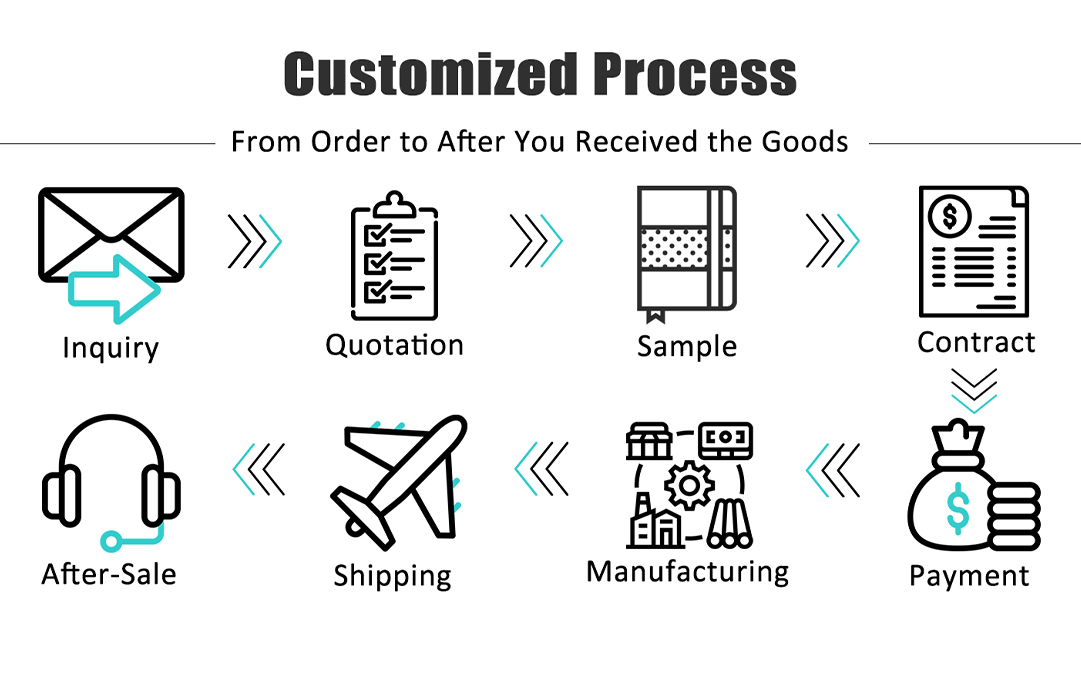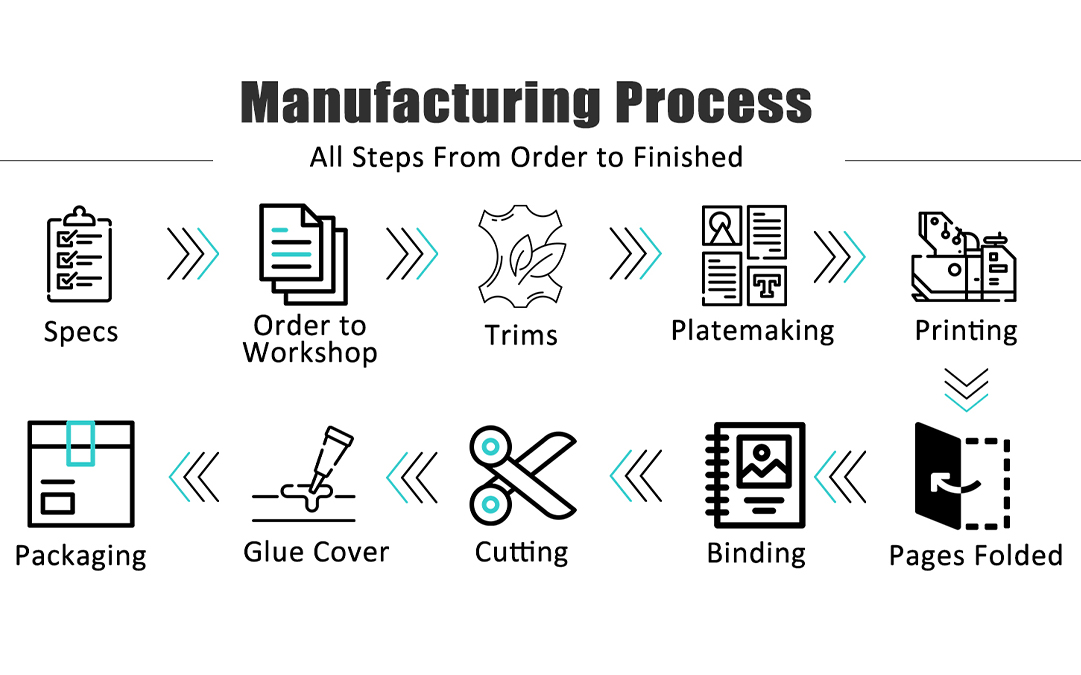Eco-Friendly Notebook Options for Environmentally Conscious Consumers
As an environmentally conscious consumer of manufacturing notebook, you might be wondering if there are eco-friendly options available for your stationery needs. In the notebook printing industry, there are several sustainable practices and materials that can help reduce your environmental footprint. Let’s explore these options together.
Recycled Paper Notebooks for Manufacturing Notebook
One of the most significant eco-friendly options is using recycled paper in Manufacturing Notebook. Recycled paper reduces the need for virgin wood pulp, saving trees and reducing deforestation. By choosing notebooks made from 100% recycled paper, you not only help conserve forests but also decrease the energy and water consumption associated with paper production.
Recycled paper notebooks are an excellent choice for anyone looking to minimize their environmental impact. The production process for recycled paper consumes less energy and water compared to traditional paper manufacturing. Additionally, it generates fewer greenhouse gas emissions, contributing to a lower carbon footprint. Many brands now offer notebooks made entirely from recycled paper, ensuring that no new trees are cut down to produce them. By opting for these notebooks, you support sustainable forestry practices and help reduce waste in landfills.
FSC-Certified Paper for Manufacturing Notebook Usage
When selecting a notebook, look for those with FSC (Forest Stewardship Council) certification. FSC-certified paper ensures that the paper comes from responsibly managed forests that provide environmental, social, and economic benefits. This certification helps protect forests, wildlife, and the rights of workers and indigenous people.
FSC certification is a trusted mark of responsible forestry. It ensures that the wood used to produce the paper comes from forests that are managed in a way that preserves biological diversity and benefits the lives of local people and workers. Choosing FSC-certified notebooks supports sustainable forest management practices, promoting the long-term health of forest ecosystems. This certification is increasingly recognized and valued by environmentally conscious consumers who want to make a positive impact with their purchases.
Soy-Based Inks for Manufacturing Notebook Usage
Traditional printing inks are petroleum-based and contain harmful chemicals. However, eco-friendly notebooks often use soy-based inks, which are derived from soybeans. Soy-based inks are more sustainable, produce vibrant colors, and are easier to recycle compared to their petroleum-based counterparts.
Soy-based inks offer several environmental benefits. They are biodegradable and contain lower levels of volatile organic compounds (VOCs), which contribute to air pollution. The use of soy-based inks in notebook printing not only enhances the recyclability of the paper but also reduces the overall environmental impact of the printing process. By choosing notebooks printed with soy-based inks, you support the shift towards more sustainable and less toxic printing practices.
Biodegradable and Recyclable Binding Materials
The binding of notebooks can also be eco-friendly. Some manufacturers use biodegradable or recyclable materials for the binding, such as natural adhesives, cotton threads, or recycled metals. These materials help ensure that the entire notebook can be recycled or will decompose naturally, reducing landfill waste.
Eco-friendly binding materials contribute significantly to the sustainability of notebooks. Natural adhesives and cotton threads are biodegradable and reduce reliance on synthetic materials that can take years to break down. Recycled metals used in spiral bindings or clips can be easily recycled again at the end of the notebook’s life. By opting for notebooks with biodegradable or recyclable bindings, you help ensure that every part of your notebook is environmentally friendly.
Minimalist and Zero-Waste Packaging
Eco-friendly notebook brands often emphasize minimalist packaging. By reducing unnecessary packaging or using recyclable and biodegradable materials, these brands minimize waste and lower the environmental impact. This practice aligns with the principles of zero waste and helps reduce the overall carbon footprint of the product.
Minimalist packaging not only reduces waste but also conserves resources used in the production and transportation of packaging materials. Brands that adopt zero-waste principles often use packaging made from recycled paper or cardboard, which can be easily recycled or composted. By choosing notebooks with minimalistic and eco-friendly packaging, you support efforts to reduce waste and promote a circular economy.
Upcycled and Repurposed Materials
Some innovative notebook manufacturers use upcycled and repurposed materials. For example, covers made from recycled fabrics, old maps, or even reclaimed wood can give notebooks a unique and eco-friendly appeal. By choosing these products, you support the reduction of waste and the creative reuse of materials.
Upcycled notebooks are a fantastic way to make use of materials that would otherwise end up in landfills. Each upcycled notebook is unique, offering a distinct look and feel that sets it apart from mass-produced products. The creative use of repurposed materials not only reduces waste but also promotes a culture of sustainability and innovation. By selecting upcycled notebooks, you encourage manufacturers to find new and inventive ways to repurpose waste materials.
Carbon-Neutral Manufacturing
Carbon-neutral manufacturing is another important aspect to consider. Some notebook companies offset their carbon emissions by investing in renewable energy projects or planting trees. By supporting these companies, you contribute to efforts to combat climate change and promote sustainable business practices.
Carbon-neutral manufacturing aims to balance out the carbon emissions produced during the manufacturing process. Companies achieve this by measuring their carbon footprint and investing in projects that reduce or offset these emissions, such as reforestation or renewable energy initiatives. By choosing notebooks from carbon-neutral manufacturers, you support efforts to mitigate climate change and reduce the overall environmental impact of production.
Locally Sourced Materials and Production
Supporting local businesses that use locally sourced materials can also be an eco-friendly choice. Local production reduces transportation emissions and supports the local economy. By choosing notebooks made close to home, you help lower the environmental impact associated with long-distance shipping.
Local sourcing not only reduces carbon emissions but also supports community economies and ensures greater transparency in the supply chain. By opting for locally produced notebooks, you contribute to a reduction in the environmental impact of transportation and support the livelihoods of local workers. This choice also often ensures fresher, higher-quality materials and products.
Supporting Sustainable Brands
Lastly, supporting brands that prioritize sustainability and transparency in their supply chains is crucial. Many eco-friendly notebook brands are committed to ethical practices, fair trade, and reducing their environmental impact. By choosing these brands, you help promote a more sustainable and responsible industry.
Sustainable brands often go beyond just offering eco-friendly products. They commit to ethical labor practices, fair wages, and transparency in their supply chains. By supporting these brands, you not only purchase a high-quality, eco-friendly notebook but also contribute to a more equitable and sustainable global economy. These brands often engage in continuous efforts to reduce their environmental footprint and set new standards for corporate responsibility.
Conclusion
In conclusion, as a consumer, you have the power to make eco-friendly choices in the notebook printing industry. By opting for products made from recycled materials, FSC-certified paper, soy-based inks, and other sustainable practices, you can contribute to a healthier planet while still enjoying high-quality notebooks.
The notebook printing industry is evolving to meet the demands of environmentally conscious consumers. With options like recycled paper, FSC certification, soy-based inks, biodegradable bindings, minimalist packaging, upcycled materials, carbon-neutral manufacturing, locally sourced materials, and sustainable brands, there is a wide range of eco-friendly choices available. Each of these options plays a part in reducing the environmental impact of notebook production and promoting sustainable practices.
By making informed choices and supporting eco-friendly brands, you can enjoy your stationery needs while also taking care of the planet. Let’s work together to create a sustainable future, one notebook at a time.
This blog post should be comprehensive enough to cover all the important aspects of eco-friendly notebook options, helping to attract environmentally conscious consumers to your products.
Contact Us: Ms. Rimo Lau WhatsApp Me
Whatsapp: 0086 18336352791 – WeChat&Phone
Website: www.fullcolorprintstationery.com
E-Mail: [email protected]





